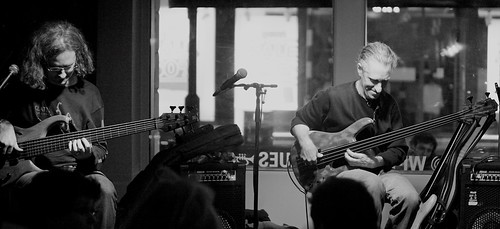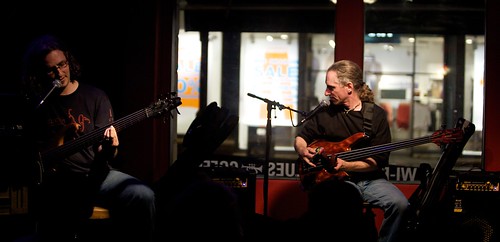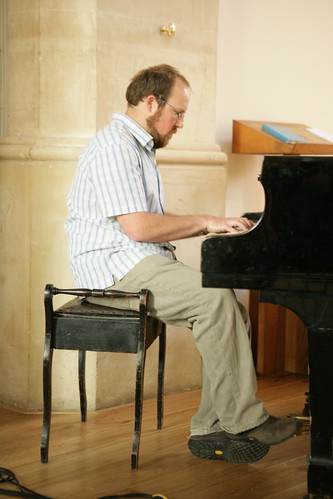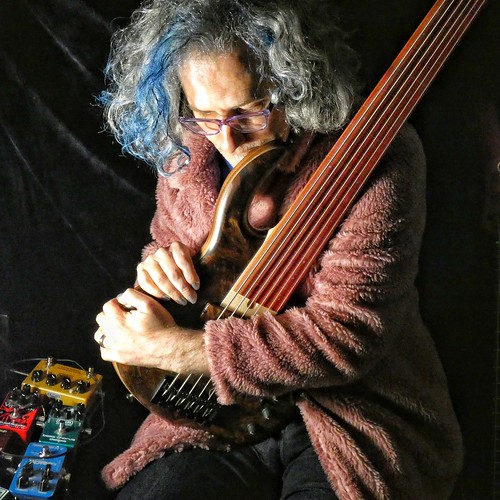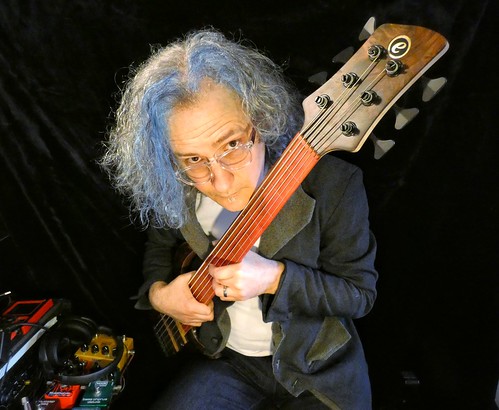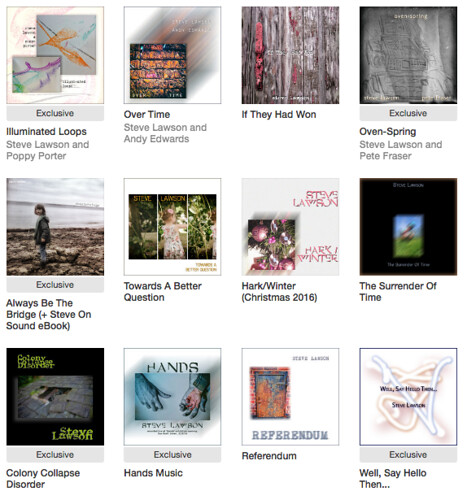Day 3, and today also happens to be the 20th anniversary of my first website going online! The one that eventually became this site here. When I got my first laptop in 1997, it was because I’d started writing for Bassist Magazine, and the first thing I ever wrote to them I actually hand wrote and posted to them. So, that was insane, and I needed a way to get stuff to them more easily. So I bought a laptop, and not long after, a dial-up modem for it. I got myself a Compuserve address, and used some kind of by-the-minute dial-up access thing for a while, before finding an email company in Orkney via some excellent geek friends, called Zetnet. Zetnet email came with webspace, but I initially assumed making a website required expensive software and stuff that I didn’t have. It didn’t take me long to work out that if I knew just a little HTML, I could hand code a site just in notepad, and if I saved the text files as .html and one of them was called index.html I could upload them to my Zetnet space and have my own website! What an extraordinary thing. The version on archive.org dates it to 20 years ago today, but in thinking about it, that may actually be the day that I added a counter, as that’s what the image shows…
Anyway, what does this have to do with collaboration? Well, one of the first things I was able to do when I got online was start to contact my music heroes, people I wanted to be able to interview for Bassist magazine, and the companies that made the gear I was interested in. I remember finding Modulus’ website, and discovering that their artist relations person was also a big Bruce Cockburn fan…
And one of the people I first got in touch with was Michael Manring. I already had his Thonk album, and having read a bunch of interviews with him, was deeply inspired and influenced by his take on solo bass. This was before I’d released anything solo, but I was starting to play things at guitar shows, and I was on a record with a quartet called Ragatal, with flamenco guitar, tabla and electric violin. I sent a copy to Michael, and we struck up an email correspondence.
Fast forward to my first NAMM show in 1999, and I met up with Michael and interviewed him for Bassist mag. I was driving up to the Bay Area to visit Rick Turner, Modulus and Zon Guitars and found out that Michael was playing a solo show opening for Trey Gunn (who I’d recently interviewed for Bassist Mag in London). So I thought ‘I’ll go to the show’. Michael offered to let me stay at his house, and I set off. But I had no map, and sat nav didn’t exist then. So I drove through San Francisco, with no idea where I was going, out the other side, and over the Golden Gate Bridge. That was obviously not the way to the venue (which I only knew was called the Last Day Saloon and was in-or-near Chinatown) – so I turned round, came back over the bridge, guessed a turning, eventually stopped and asked someone randomly who told me I was about three blocks away… 🙂
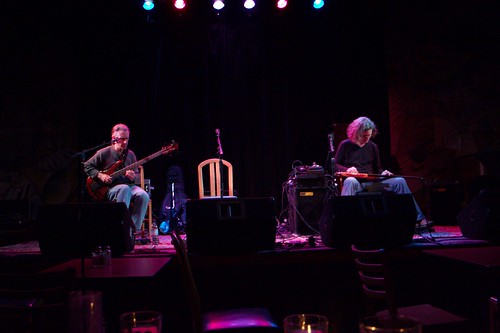 Anyway, that’s not what this is about. Collaboration is the theme here, and Michael became a collaborator the following year, when we both played a solo bass gig in Santa Cruz and did a thing together at the end. Over the next few years we did a LOT of shows both in California and around England, and in those duo shows I got to discover much of what was possible at the intersection of two bass guitars (albeit to heavily processed and decidedly weird bass guitars). We played sold out shows, did clinics together, and drove a lot of miles – I think at this point I’ve probably done more shows with Michael than any other improv collaborator besides Lobelia. And the whole thing was an extraordinary eye-opening experience. Remember, here was the person who introduced me to the idea of looping, whose records made me want to be a solo bassist, who had inspired me for many years, and there we were playing loads of weird and wonderful improvised music. We’ve never rehearsed together, never played not in front of an audience. Only twice ever played a prewritten tune together (we did Autumn Leaves as a duo, and played Blue In Green in a trio with David Friesen… Oh, and we did a version of All Blues in a trio with the very brilliant John Lester when he opened for us on tour!)
Anyway, that’s not what this is about. Collaboration is the theme here, and Michael became a collaborator the following year, when we both played a solo bass gig in Santa Cruz and did a thing together at the end. Over the next few years we did a LOT of shows both in California and around England, and in those duo shows I got to discover much of what was possible at the intersection of two bass guitars (albeit to heavily processed and decidedly weird bass guitars). We played sold out shows, did clinics together, and drove a lot of miles – I think at this point I’ve probably done more shows with Michael than any other improv collaborator besides Lobelia. And the whole thing was an extraordinary eye-opening experience. Remember, here was the person who introduced me to the idea of looping, whose records made me want to be a solo bassist, who had inspired me for many years, and there we were playing loads of weird and wonderful improvised music. We’ve never rehearsed together, never played not in front of an audience. Only twice ever played a prewritten tune together (we did Autumn Leaves as a duo, and played Blue In Green in a trio with David Friesen… Oh, and we did a version of All Blues in a trio with the very brilliant John Lester when he opened for us on tour!)
Part of me wishes I had more recordings of those early gigs. Part of me is happier to remember how they felt than get hung up on what the music actually sounded like. But I was being stretched, trying to rise to the challenge of playing improvised shows with easily one of the most brilliant musicians ever to pick up the bass guitar. He was ceaseless in his encouragement and support for me – and still is! – and he became a supremely valued friend.
There were so many things I learned playing with Michael, and watching him play solo, so many times when I wondered if what I was doing was any good, and his words of encouragement dispelled doubts. And none more so than when we played a house concert at the home of the inventor of the Looperlative, Bob Amstadt, in 2012, and I suggested doing two solo sections in the first set and then some duo stuff later on, and he said ‘no! let’s do it all duo!’ And we did, and I was finally able to record what we sounded like properly, and get it out there. The album, Language Is A Music, is still subscriber-only, and you can get it here – it’s something that I’m not only deeply proud of as a work of art, but which represents almost two decades of playing together, of friendship, encouragement, of growing as a musician and improvisor, and learning from one of the greatest musicians I’ve ever heard, let alone been on stage with.

